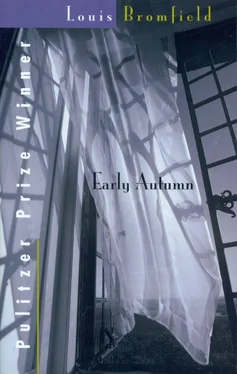(She thought, “They must be almost to Salem by now.”) And aloud she added, “You’re her father, Anson; why don’t you speak?”
“It’s better for you. I’ve no influence with her.”
“I have spoken,” she said, thinking bitterly that he could never guess what she meant.
“And what’s the result? Look at her, going off at this hour of the night. …”
She shrugged her shoulders, filled with a warm sense of having outwitted the enemy, for at the moment Anson seemed to her an enemy not only of herself, but of Jean and Sybil, of all that was young and alive in the world.
“Besides,” he was saying, “she hasn’t proper respect for me … her father. Sometimes I think it’s the ideas she got from you and from going abroad to school.”
“What a nasty thing to say! But if you want the truth, I think it’s because you’ve never been a very good father. Sometimes I’ve thought you never wanted children. You’ve never paid much attention to them … not even to Jack … while he was alive. It wasn’t ever as if they were our children. You’ve always left them to me … alone.”
The thin neck stiffened a little and he said, “There are reasons for that. I’m a busy man. … I’ve given most of my time, not to making money, but to doing things to better the world in some way. If I’ve neglected my children it’s been for a good reason … few men have as much on their minds. And there’s been the book to take all my energies. You’re being unjust, Olivia. You never could see me as I am.”
“Perhaps,” said Olivia. (She wanted to say, “What difference does the book make to anyone in the world? Who cares whether it is written or not?”) She knew that she must keep up her deceit, so she said, “You needn’t worry, because Sabine is going away tomorrow and Jean will go with her.” She sighed. “After that your life won’t be disturbed any longer. Nothing in the least unusual is likely to happen.”
“And there’s this other thing,” he said, “this disloyalty of yours to me and to all the family.”
Stiffening slightly, she asked, “What can you mean by that?”
“You know what I mean.”
She saw that he was putting himself in the position of a wronged husband, assuming a martyrdom of the sort which Aunt Cassie practiced so effectively. He meant to be a patient, well-meaning husband and to place her in the position of a shameful woman; and slowly, with a slow, heavy anger, she resolved to circumvent his trick.
“I think, Anson, that you’re talking nonsense. I haven’t been disloyal to anyone. Your father will tell you that.”
“My father was always weak where women are concerned, and now he’s beginning to grow childish. He’s so old that he’s beginning to forgive and condone anything.” And then after a silence he said, “This O’Hara. I’m not such a fool as you think, Olivia.”
For a long time neither of them said anything, and in the end it was Olivia who spoke, striking straight into the heart of the question. She said, “Anson, would you consider letting me divorce you?”
The effect upon him was alarming. His face turned gray, and the long, thin, oversensitive hands began to tremble. She saw that she had touched him on the rawest of places, upon his immense sense of pride and dignity. It would be unbearable for him to believe that she would want to be rid of him in order to go to another man, especially to a man whom he professed to hold in contempt, a man who had the qualities which he himself did not possess. He could only see the request as a humiliation of his own precious dignity.
He managed to grin, trying to turn the request to mockery, and said, “Have you lost your mind?”
“No, Anson, not for a moment. What I ask is a simple thing. It has been done before.”
He did not answer her at once, and began to move about the room in the deepest agitation, a strange figure curiously out of place in the midst of Horace Pentland’s exotic, beautiful pictures and chairs and bibelots—as wrong in such a setting as he had been right a month or two earlier among the museum of Pentland family relics.
“No,” he said again and again. “What you ask is preposterous! Tomorrow when you are less tired you will see how ridiculous it is. No … I couldn’t think of such a thing!”
She made an effort to speak quietly. “Is it because you don’t want to put yourself in such a position?”
“It has nothing to do with that. Why should you want a divorce? We are well off, content, comfortable, happy. …”
She interrupted him, asking, “Are we?”
“What is it you expect, Olivia … to live always in a sort of romantic glow? We’re happier than most.”
“No,” she said slowly. “I don’t think happiness has ever meant much to you, Anson. Perhaps you’re above such things as happiness and unhappiness. Perhaps you’re more fortunate than most of us. I doubt if you have ever known happiness or unhappiness, for that matter. You’ve been uncomfortable when people annoyed you and got in your way, but … that’s all. Nothing more than that. Happiness … I mean it in the sensible way … has sometimes to do with delight in living, and I don’t think you’ve ever known that, even for a moment.”
He turned toward her saying, “I’ve been an honest, God-fearing, conscientious man, and I think you’re talking nonsense!”
“No, not for a moment. … Heaven knows I ought to know the truth of what I’ve been saying.”
Again they reached an impasse in the conversation and again they both remained silent, disturbed perhaps and uneasy in the consciousness that between them they had destroyed something which could never be restored; and yet with Olivia there was a cold, sustained sense of balance which came to her miraculously at such times. She felt, too, that she stood with her back against a wall, fighting. At last she said, “I would even let you divorce me—if that would be easier for you. I don’t mind putting myself in the wrong.”
Again he began to tremble. “Are you trying to tell me that. …”
“I’m not telling you anything. There hasn’t been anything at all … but … but I would give you grounds if you would agree.”
He turned away from her in disgust. “That is even more impossible. … A gentleman never divorces his wife.”
“Let’s leave the gentlemen out of it, Anson,” she said. “I’m weary of hearing what gentlemen do and do not do. I want you to act as yourself, as Anson Pentland, and not as you think you ought to act. Let’s be honest. You know you married me only because you had to marry someone … and I … I wasn’t actually disreputable, even if, as you remind me, my father was shanty Irish. And … let’s be just too. I married you because I was alone and frightened and wanted to escape a horrible life with Aunt Alice. … I wanted a home. That was it, wasn’t it? We are both guilty, but that doesn’t change the reality in the least. No, I fancy you practiced loving me through a sense of duty. You tried it as long as you could and you hated it always. Oh, I’ve known what was going on. I’ve been learning ever since I came to Pentlands for the first time.”
He was regarding her now with a fixed expression of horrid fascination; he was perhaps even dazed at the sound of her voice, slowly, resolutely, tearing aside all the veils of pretense which had made their life possible for so long. He kept mumbling, “How can you talk this way? How can you say such things?”
Slowly, terribly, she went on and on: “We’re both guilty … and it’s been a failure, from the very start. I’ve tried to do my best and perhaps sometimes I’ve failed. I’ve tried to be a good mother … and now that Sybil is grown and Jack … is dead, I want a chance at freedom. I’m still young enough to want to live a little before it is too late.”
Читать дальше












